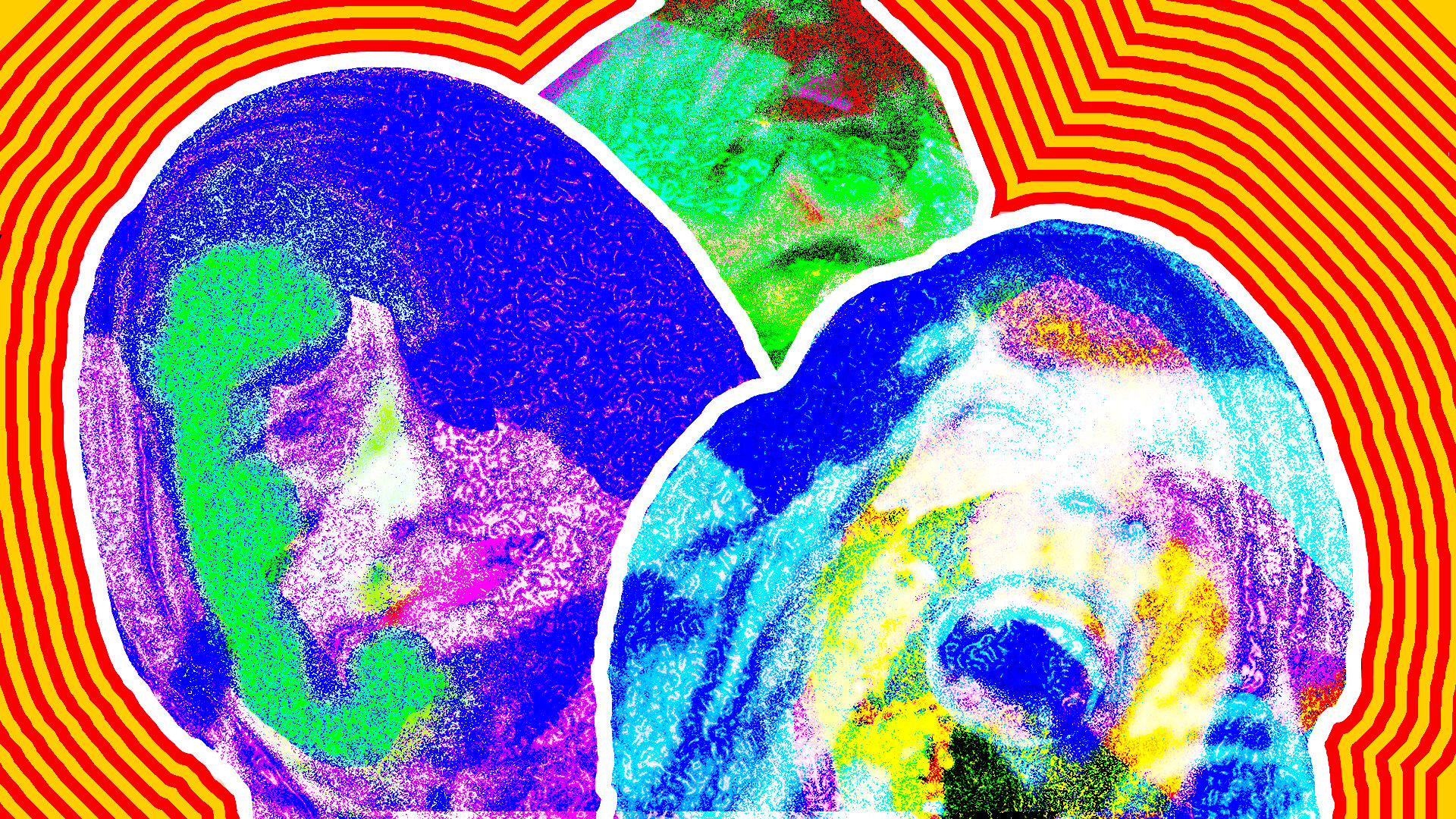Seriously Funny
D.C.’s alt comedy scene demonstrates the city’s lighter side.
Words and Artwork by Michelle Goldchain
A man gives a presentation, but no one in the audience is there to learn.
He does not know what he is talking about either way; he is the first to admit this. His presentation is on the plot of the 1997 film Titanic.
There’s just one problem: He has not seen Titanic. Nor has he read the Titanic script. In fact, the only thing he really knows about Titanic is that the ship sinks. And this is exactly what makes his presentation all the better.
Despite the PowerPoint presentation, projector, and captivated audience, this act is more of a performance than a lecture. If there is anything at all to learn from the antics, it's this: Washington, D.C., is a seriously funny city.
Despite the overall stern demeanor that the nation’s capital tends to be known for—the “So, what do you do?” shifty-eyed questions, the lawyers who can’t not tell you they’re lawyers, and the schmos who like to say they’re from D.C., but really live in Arlington—this city is on the rise when it comes to giggles and guffaws. Sure, the District doesn’t hold a candle to other cities like New York, Los Angeles, or Chicago. Even so, there is one specific style of comedy that is picking up steam and proving that this city has a weird side—a really, really weird side.
“The definition [of alt comedy] has become so broad that it almost arguably doesn’t mean anything anymore, aside from being a rejection of club comedy.”
What’s causing crowds to pack into clubs and divey venues is none other than alternative comedy, otherwise known as alt comedy. As opposed to typical stand-up comedy (i.e., “What’s the deal with airplane food?”), this style focuses on finding ways to push the boundaries of what can be considered funny. Common alt comedy methods include absurdist PowerPoint presentations, fake Bible sermons, and awkward summer camp-style singalongs. Such oddball skits may amuse, but are more likely to puzzle the audience.
Nate Johnson is a stand-up comedian and co-founder of The Summer Camp Show, an alternative, improvised adventure where comedians perform sketches and songs on stage, while pretending to be in an outdoorsy summer camp. The last Summer Camp Show was in March of 2018 at D.C.’s Wonderland Ballroom. For Johnson, alternative comedy offers the element of surprise. This variety is exactly what makes “alternative comedy” so hard to define.
“The definition has become so broad that it almost arguably doesn’t mean anything anymore, aside from being a rejection of club comedy,” says Johnson.
This head-scratching, eyebrow-raising style of funny is part of a generational shift toward absurd humor. Washington Post opinion columnist Elizabeth Bruenig once probed what makes millennials laugh. Against a backdrop of student debt and dimming faith in national politics, Bruenig considered the irony and lack of coherence in modern memes. “Millennial surrealism intermixes relief with stress and levity with lunacy,” Bruenig concluded.
On TV, Cartoon Network’s Adult Swim became a thriving hub for alt comedy hits like The Tim and Eric Awesome Show, Great Job!, Rick and Morty, and The Eric Andre Show. Some stand ups, including Bill Burr, criticized the highly choreographed sketches for distancing comedians from their audiences. According to Burr and other detractors, alt comedy’s “womb...distilled all of the horror out of attempting to be a comedian.”
Alyssa Cowan, an observational and upbeat stand-up comedian, podcaster, and performance artist, disagrees. In her experience, alternative comedians actually are more likely to experience risks by being weird.
“I’ve run alternative comedy shows for a while, and I’ve seen heckling, I’ve seen drunks, I’ve seen obnoxious behavior, [and] I’ve seen aggressiveness from the crowd and other comics,” Cowan says.
Natalie McGill shares Cowan’s experience. McGill is a comedian, comedy writer for Redacted Tonight on RT America, and co-founder of The Summer Camp Show.
McGill says, “There’s no guarantee that people are going to be on board with you. I mean, it’s like that for stand-up in general anyway…but I think it’s especially a higher risk.”
D.C. makes sense as a hotspot for weirder, riskier comedy. The city is acclimated to opposition, filled with politicians, businessmen, and the people who actually live here because it’s their home, not their workplace. The District is also often the hub of endless shock value — have you seen the news lately? Worse yet, those who can affect change in this nation are everyday neighbors, while the more than 700,000 in the city remain without voting power. Surprise is normal in the District, but it is more often than not followed by agonizing stress. Alternative comedy is a way to regain the joy in it.
D.C. has a long history of producing prominent comedians originating from the area, from Dave Chappelle to Wanda Sykes to Patton Oswalt. For years, news publications like Washington City Paper and The Washington Post have gushed about the local comedy scene and wondered if it could ever compete with cities like New York and Chicago that are known for catapulting the careers of funny people.
Today, alt comedy might finally put D.C.’s comedians on the map, following in the footsteps of alt comedy luminaries such as Nathan Fielder, Bo Burnham, Eric Andre, or Tim Heidecker and Eric Wareheim, who perform as a duo. Venues across the city are seeing packed rooms and sold-out shows for specifically alternative comedy shows and open-mics.
One such alt comedy catalysts is Church Night, a religious parody show that began in 2013, offering “prayer wars, hands on healing, post mortem last rites, regular funerals, ‘fun’ funerals, weddings, missionary, massage, hot dog breaks, and cat sitting.” Linsay Deming, Landon Letzkus, and Jeremy Frank write, produce, and perform in the show. It has been hosted at The Wonderland Ballroom in Columbia Heights, the Black Cat in 14th Street NW, and it has expanded to New York City and has performed at Tig Notaro’s comedy festival, The Bentzen Ball. Church Night has since expanded into a web series.
McGill credits Church Night as the first out-of-the-box, alternative sketch show in Washington, D.C., that had a lot of production value and that wasn’t straight stand-up. She says, “It was all for fun, but they always had some time of deeper meaning behind what they were joking about.”
Comedian Ian McDermott, otherwise known by his stage name as Perth O'duibhdiorma, is another pioneering figure in DC’s alt comedy scene. McDermott is a multi-talented new media artist, composer, coder, and comedian that is well-acknowledged for his influence in the city’s comedy scene.
“He’s brilliant, and he’s all-around weird,” Cowan says. “I feel like he was doing weird stuff so early. He was before his time. I think he’s one of the funniest people I’ve ever seen.” She’s seen him do “crazy, nuts things” like “shout-sing” into people’s faces while standing on tables.
McDermott first started performing comedy in D.C. in 2011. His main influences include Adult Swim and British TV series The Mighty Boosh, Brass Eye, and Snuff Box. When he first began performing, he says, there really was no alternative comedy scene in the city. When he would dress in a costume, pretend to have a different moniker, and attempt to throw off an everyday open mic with music, he said, “People would always be like, ‘What was that? It was kind of funny, but what was that? That wasn’t stand-up.’”
Stand-up or not, alternative comedy shows can be varied and unstructured enough to suit any peculiar or niche tastes. For those who miss the classroom environment, Fale University allows comedians to lecture on specific subjects, such as chemistry or archaeology, while having “totally, definitely, legit academic standards.” The Time Machine Roast is focused solely on comedians acting as specific characters from history, while wearing costumes, and, of course, taking a critical look at the legacy of these figures, roasting their hypocrisies and mistakes.
Other shows and collectives, such as Laugh Owens Laugh and The Comedy Potluck, also are well-known in the city for their weird and creative comedians, while smaller venues, such as non-profit RhizomeDC in Takoma and Drafthouse Comedy Theater in Downtown, have been known to occasionally host especially wacky comedy events as well.
But why has alternative comedy proliferated in DC at all? McDermott says it’s because DC itself is an essentially surreal city. As the central hub of the world’s most powerful nation, there is a large population of people who aggressively try to gain power and wealth. On the other hand, there are others who live alongside these strivers without sharing—or possibly opposing—their mindset.
“The people that aren’t power-hungry see the absurdity in their grappling for this power and wealth,” McDermott says, adding, “I think the alternative comedy—as opposed to regular stand-up—has a power to really heighten this absurdity, especially because we’re using new media tools like projections and music.”
Johnson suspects that D.C.’s disproportionately well-educated population might be the cause of alt comedy’s popularity in the city. D.C.’s crowds are willing to pay attention even if a comedian is not being incredibly dynamic on stage. For Johnson, this presents the opportunity to perform intellectual, cerebral material that might be riskier in another setting.
D.C.’s reputation as a comedy-rich city depends on people who are willing to stay and nurture it. D.C.’s “talent vacuum” stunts its comedy prominence, according to McGill. Many comedians flee D.C. for the greener pastures of New York, Chicago, or Los Angeles to grow their careers.
“We have the capacity to have a really great alternative comedy scene,” says McGill, “but it’s all dependent on who wants to stay and build that, and we can’t expect people to stay here forever if they want to make a career out of it or want to see something grow beyond D.C.”
Perhaps, that is the greatest absurdity of all: A comedy scene forever growing and getting laughs, but never able to make it big enough to gain nationwide recognition.







